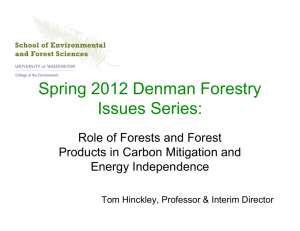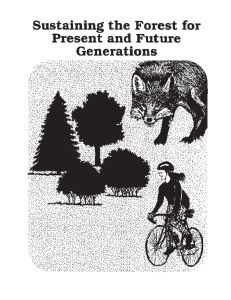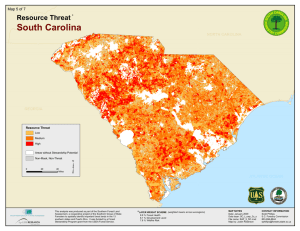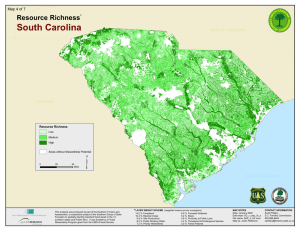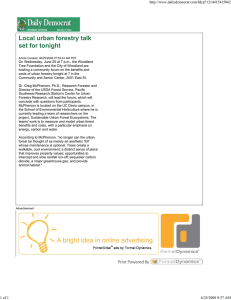News
advertisement
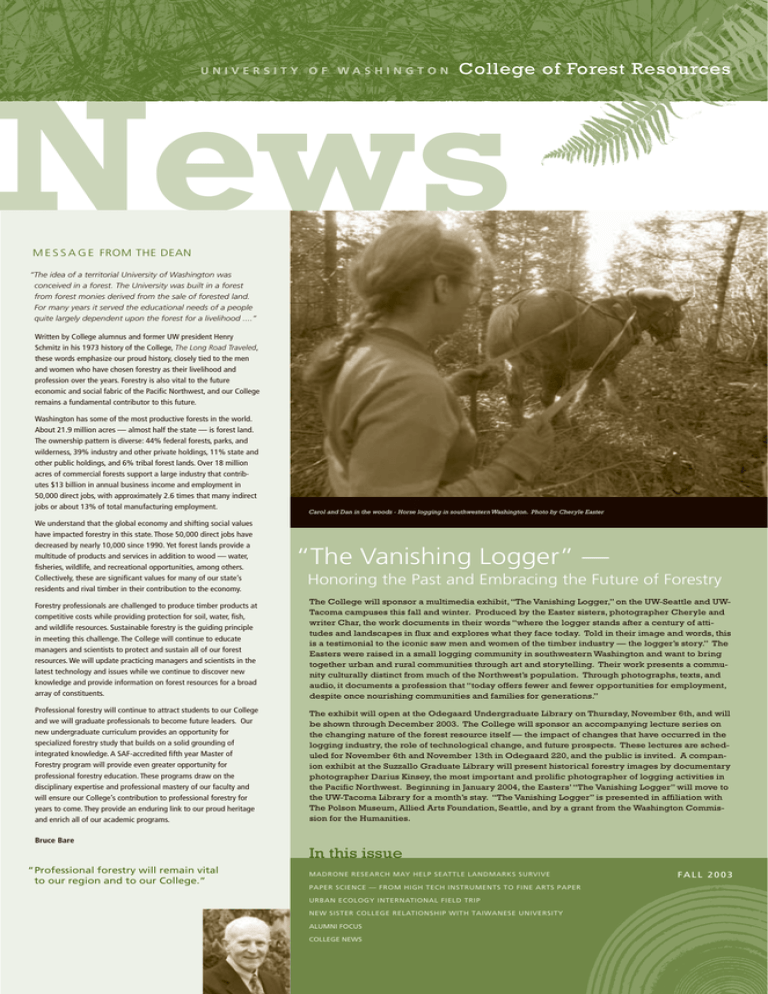
UNIVERSITY OF WASHINGTON of Forest Resources CollegeCollege of Forest Resources UNIVERSITY OF WASHINGTON News M E S S A G E FROM THE DEAN “The idea of a territorial University of Washington was conceived in a forest. The University was built in a forest from forest monies derived from the sale of forested land. For many years it served the educational needs of a people quite largely dependent upon the forest for a livelihood ....” Written by College alumnus and former UW president Henry Schmitz in his 1973 history of the College, The Long Road Traveled, these words emphasize our proud history, closely tied to the men and women who have chosen forestry as their livelihood and profession over the years. Forestry is also vital to the future economic and social fabric of the Pacific Northwest, and our College remains a fundamental contributor to this future. Washington has some of the most productive forests in the world. About 21.9 million acres — almost half the state — is forest land. The ownership pattern is diverse: 44% federal forests, parks, and wilderness, 39% industry and other private holdings, 11% state and other public holdings, and 6% tribal forest lands. Over 18 million acres of commercial forests support a large industry that contributes $13 billion in annual business income and employment in 50,000 direct jobs, with approximately 2.6 times that many indirect jobs or about 13% of total manufacturing employment. We understand that the global economy and shifting social values have impacted forestry in this state. Those 50,000 direct jobs have decreased by nearly 10,000 since 1990. Yet forest lands provide a multitude of products and services in addition to wood — water, fisheries, wildlife, and recreational opportunities, among others. Collectively, these are significant values for many of our state’s residents and rival timber in their contribution to the economy. Forestry professionals are challenged to produce timber products at competitive costs while providing protection for soil, water, fish, and wildlife resources. Sustainable forestry is the guiding principle in meeting this challenge. The College will continue to educate managers and scientists to protect and sustain all of our forest resources. We will update practicing managers and scientists in the latest technology and issues while we continue to discover new knowledge and provide information on forest resources for a broad array of constituents. Professional forestry will continue to attract students to our College and we will graduate professionals to become future leaders. Our new undergraduate curriculum provides an opportunity for specialized forestry study that builds on a solid grounding of integrated knowledge. A SAF-accredited fifth year Master of Forestry program will provide even greater opportunity for professional forestry education. These programs draw on the disciplinary expertise and professional mastery of our faculty and will ensure our College’s contribution to professional forestry for years to come. They provide an enduring link to our proud heritage and enrich all of our academic programs. Carol and Dan in the woods - Horse logging in southwestern Washington. Photo by Cheryle Easter “The Vanishing Logger” — Honoring the Past and Embracing the Future of Forestry The College will sponsor a multimedia exhibit, “The Vanishing Logger,” on the UW-Seattle and UWTacoma campuses this fall and winter. Produced by the Easter sisters, photographer Cheryle and writer Char, the work documents in their words “where the logger stands after a century of attitudes and landscapes in flux and explores what they face today. Told in their image and words, this is a testimonial to the iconic saw men and women of the timber industry — the logger’s story.” The Easters were raised in a small logging community in southwestern Washington and want to bring together urban and rural communities through art and storytelling. Their work presents a community culturally distinct from much of the Northwest’s population. Through photographs, texts, and audio, it documents a profession that “today offers fewer and fewer opportunities for employment, despite once nourishing communities and families for generations.” The exhibit will open at the Odegaard Undergraduate Library on Thursday, November 6th, and will be shown through December 2003. The College will sponsor an accompanying lecture series on the changing nature of the forest resource itself — the impact of changes that have occurred in the logging industry, the role of technological change, and future prospects. These lectures are scheduled for November 6th and November 13th in Odegaard 220, and the public is invited. A companion exhibit at the Suzzallo Graduate Library will present historical forestry images by documentary photographer Darius Kinsey, the most important and prolific photographer of logging activities in the Pacific Northwest. Beginning in January 2004, the Easters’ “The Vanishing Logger” will move to the UW-Tacoma Library for a month’s stay. “The Vanishing Logger” is presented in affiliation with The Polson Museum, Allied Arts Foundation, Seattle, and by a grant from the Washington Commission for the Humanities. Bruce Bare In this issue “Professional forestry will remain vital to our region and to our College.” MADRONE RESEARCH MAY HELP SEATTLE LANDMARKS SURVIVE PAPER SCIENCE — FROM HIGH TECH INSTRUMENTS TO FINE ARTS PAPER URBAN ECOLOGY INTERNATIONAL FIELD TRIP NEW SISTER COLLEGE RELATIONSHIP WITH TAIWANESE UNIVERSITY ALUMNI FOCUS COLLEGE NEWS FALL 2003 peels in the summer exposing new, light-green bark, madrones have shiny leaves and red berries in the fall. The trees can survive in rocky soils and dry conditions and thrive on neglect. Native American tribes historically used the bark and fruit for medicinal purposes and cured the wood to make sacred objects. Madrones are a source of food and habitat to a variety of wildlife. A decline in Pacific madrone has been reported during the past 30 years in the Pacific Northwest. First seen in urban areas, declining trees are also found in natural forests throughout the tree’s entire range. CFR researchers — Professor Bob Edmonds, PhD candidate Marianne Elliott, and former MFR student Scott Mayer — are among the few scientists doing research on the decline of Pacific madrone. The three recently published a paper in Northwest Science discussing the possible role of fungal diseases. Elliott also maintains a website, The Arbutus Page, at http://students.washington.edu/melliott/arbutus/Arbutus.html A scenic view from Seattle’s Magnolia Bluffs. Most of the larger madrones are dying. Madrone Research May Help Seattle Landmarks Survive Seattle’s Magnolia Boulevard is an important stop for visitors from all over the world who alight from cars and tour buses to photograph the trees and views. The Boulevard’s madrone trees are a prominent landmark seen from Puget Sound and Elliott Bay. During Captain George Vancouver’s 1792 voyage along the Northwest coast, the ship’s surgeon-naturalist Archibald Menzies gave the trees the scientific name “Arbutus menziesii.” The trees’ prominence caused Seattle’s Magnolia neighborhood to be misnamed — one theory is that the area was named in 1857 by a navy geographer who mistook the madrones for magnolias. Pacific madrone is a broadleaved evergreen native to the western US and Canada. It is the largest member of the family Ericaceae, which also includes rhododendrons, azaleas, and salal. Attractive, with cinnamon-colored bark that The researchers found that all ages and sizes of madrones are affected, with larger, older trees suffering most mortality. The species adapted to frequent fires that no longer occur in the tree’s urban range and under fire suppression policies have occurred less often in natural forests. Fire plays an important role in creating stands where madrone is more competitive, as well as in destroying disease organisms. Disease is now the trees’ most devastating disturbance. The fungal culprits include Natrassia mangiferae that causes cankers and shoot blight and probably spread from Persian walnut trees in California. A closely related fungus, Fusicoccum aesculi, is a secondary pathogen that attacks trees already suffering stress by causing branch dieback. When madrone branches and terminal buds are killed by fungi, they cannot produce more foliage. Unlike fire disturbance, fungal diseases decrease starch accumulation in the root burl so that trees are less able to resprout after the aboveground part of the tree is killed by disease. As the tree weakens it goes into a process called a decline spiral. Continued research may provide clues to managing the species in urban areas and natural forests. Suggestions to help the trees fight disease include minimizing pruning, sterilizing pruning tools after each cut, and pruning during dry weather. Creating a habitat healthy for the trees by preventing soil compaction around the roots may encourage more soil aeration and beneficial mycorrhizal growth. And, because madrones are drought-tolerant trees and may actually benefit from some level of dry conditions, restraint in watering established trees older than five years may be important. Paper Science — from High Tech Instruments to Fine Arts Paper The College’s Paper Science and Engineering program, in addition to its strong undergraduate curriculum, undertakes projects that range from high tech research to using alternative fiber sources to produce fine arts paper. The Denman Endowed Professorship in Pulp and Paper Science is supporting Professor Rick Gustafson’s research to develop and patent an instrument that pulp and paper mills can use to improve product uniformity and performance, while minimizing environmental impacts. The instrument, the Total Fiber Analyzer, uses fluorescence to measure the chemical composition of single pulp fibers at high sampling rates. Previous methods of making these measurements are slow, sometimes requiring an entire day to measure the uniformity of a single pulp. Pulp uniformity is significant because non-uniform pulps are more difficult to bleach and have inferior papermaking properties. Increasing wood and bleaching costs, environmental pressures, and demands for higher quality pulp make the production of uniform pulp especially desirable. In addition to improving the quality and efficiency of papermaking, the instrument is an important research tool allowing for a better understanding of complex interactions between digester operating conditions and pulp uniformity. The Denman Professorship, created in 1994, is a gift to the College by W. Richard and Mary Ellen Denman. Meanwhile, Mark Lewis, manager of the College’s Pulp and Paper Laboratory has been collaborating with a local printing collective, Pressworks, to produce fine arts paper stocks manufactured with alternative fiber sources. The project began several years ago when a summer intern in the lab got her artist mother interested in the process of papermaking. Some of the fibers used are wheat straw, hemp, and arundo donax, a Mediterranean plant similar to bamboo and a Rick Gustafson, holder of the Denman Professorship in Pulp and Paper Science, has developed the Total Fiber Analyzer to measure pulp fiber chemical composition. perennial that can be harvested annually, growing to a height of 30 feet in one year. The plant is highly adaptable, thriving in poor soils with relatively little water, and is recognized for its role in reducing greenhouse gases. Research on arundo donax carried out at the College led to the first major non-wood pulp run in North America at Samoa Pacific Cellulose LLC in California. College News Associate Professor Ivan Eastin, learning how fibers are produced from the abaca plant in The Philippines. Eastin’s current research focuses on efficiently using tropical forest resources in sustainable forest management. College Dean’s Club Renewed Highlights Membership in the College of Forest Resources Dean’s Club honors annual donors who contribute $500 or more to the College and lifetime donors who contribute $25,000 or more. With the help of these committed supporters, the College is able to ensure scholarship and recruitment awards for top quality students and the development of new and exciting initiatives and programs. Dean’s Club members during 2002-2003 helped rebuild Merrill Hall, provided funding for the Denman Forestry Issues Series, supported scholarships across the College’s programs, helped maintain the collections in the Washington Park Arboretum, and contributed generously to the Dean’s discretionary fund. See the insert attached in this newsletter for information on becoming part of the Dean’s Club community. Sharon Doty was appointed Research Assistant Professor in the Ecosystem Sciences Division, effective August 2003, following a faculty search for a plant biotechnologist. DEAN’S CLUB LIFETIME MEMBERS: International Forestry Masters Program “Nature Days” in Forks, WA Sponsored by ONRC Encouraged by the success of a Peace Corps Masters International (PCMI) program in the Daniel J. Evans School of Public Affairs, the College has launched a new PCMI program in international forestry. Through their academic training, students in the program will learn to work with local communities to manage and protect forest ecosystems and to understand the connections among population growth, international development, and forests as sources of food, fuel, and raw materials. The new program will also enhance disciplinary collaboration between the College and the Evans School. A faculty Peace Corps Advisory Committee, chaired by Ivan Eastin and including Bob Gara and John Perez-Garcia are working to design the new program. Eastin served in the Peace Corps before coming to the College, and he, Gara, and Perez-Garcia have extensive international research and consulting experience. The goal of the new international forestry program is to admit students for Autumn 2004. The Olympic Natural Resources Center (ONRC) sponsored a two-day outreach event in June 2003 for kindergarten through third grade students from local Olympic Peninsula schools. ONRC began Nature Days seven years ago as a way to reach out to local schools when teachers suggested that the Center’s research staff could expand elementary school science programs by sharing their knowledge with kindergartners. The program has expanded in scope and size over the years, led by ONRC staff and local school and community volunteers. Nature stations provide information and hands-on learning about Olympic Peninsula ecology, with exhibits, demonstrations, and talks on subjects ranging from animal tracks, forest fire fighting (with a visit from Smokey Bear), and marine life. Denman Forestry Issues Series Prepares New Program Established by the College in 2000, the Denman Forestry Issues Series provides information and discussion for the UW community and the public on timely forestry and natural resource issues. A program in October 2003 will focus on federal forest land management policy and features Mark Rey, USDA Undersecretary for Environment and Natural Resources, as the keynote speaker. The program will include research by College faculty on topics ranging from fire to endangered species to forestry communities. Denman programs are recorded by UWTV in digital format and broadcast nationwide on the UWTV cable channel and the ResearchChannel. They can also be viewed via streaming video at the UWTV website. Past programs included such topics as forest certification, calculation of the sustainable yield from Washington’s Trust Lands, Washington’s forest regulations and their impact on the private landowner, conservation easements and land trusts, and the sustainability of natural resources. The series is funded with support from W. Richard and Mary Ellen Denman. Gordon and Irene Bergum John and Ann Bethel Alberta Corkery George Corkery Jack and Vada May Corkery Mary Ellen and W. Richard Denman Ardis Grunow Morten J. Lauridsen Jr. Robert Lencho Robert and Ruby McLachlan James W. Ridgeway Orin and Althea Soest Marge Stenzel ANNUAL MEMBERS 2002-2003: Russell and Jean Amick Lucius and Phoebe Andrew Richard and Marie Atkins Bruce Bare and Bonnie Taylor Jean Free Bolton Todd and Zeecha Brooks John and Judith Calhoun Raymond and Charlotte Chalker Lyle and Mary Jo Clark Robert and Marcia Condon Maureen E. Connors John and Marguerite Corbally Robert and Helen Curtis Robert and Karen Denman Elisabeth C. Dudley Mrs. Phil Duryee Kern Ewing Robert C. Franklin Glenn and Kitty Gardner James and Carol Green Benjamin and Margaret Hall Ben and Doris Harrison William H. Hatheway Thomas and Arline Hinckley Charles and Jessie Hotes James Howard and Nancy Winder Lyman and Gretchen Hull David and Pamela Johnston Raymond and Heather Larson Ann F. Lennartz Carey K. Miller Kimberly N. Mills Egon and Laina Molbak William and Frances Murdock George and Susanna Pinyuh Jane Meagher Puccinelli Brian and Sarah Reichard Emery and Lee Rhode Meredith and Helen Smith Bobby and Lily Takatsuka William J. Taylor P.A. Thom and R.M. Bailey Richard and Marridee Vuori Mark Wheeler and Cynthia Johnson Mary A. Whitmore Stephen and Linda Whybrew Robert and Janet Witter John A. Wott Alex Zedicoff Congratulations to the following faculty who were promoted, effective September 2003: Kern Ewing to Professor John Marzluff to Professor Clare Ryan to Associate Professor New linkages to other UW units through adjunct and joint appointments include: Linda Chalker-Scott to Adjunct Associate Professor of Landscape Architecture, effective September 2003. Sarah Reichard to Adjunct Assistant Professor of Landscape Architecture, effective September 2003. Stuart Strand to Joint Research Professor of Forest Resources and Research Professor of Civil and Environmental Engineering, effective February 2003 Kevin Hodgson received a Fulbright award and support from the Gowen International Studies Endowment to do pulp fiber research and teach at the University of Waikato in New Zealand during Winter and Spring 2004. John Calhoun, Director of the Olympic Natural Resources Center, assumed additional duties in June 2003 as Interim College Lands Manager responsible for all functions involving C. L. Pack Experimental Forest and the Lee Memorial Forest. The College received approval to fill the position of Director of the Precision Forestry Cooperative, a component of the state-funded Advanced Technology Initiative, at the senior tenured faculty level. The search for a new Director for the Center for Urban Horticulture and the Washington Park Arboretum continues and is expected to be completed during the coming academic year. Friends and supporters of the College convened in August to explore the exciting research taking place at the Olympic Natural Resources Center. The weekend trip was punctuated with Quileute drumming and dancing, a salmon barbecue, and lively discussion of Landscape Management Systems research, work to eradicate Spartina from Willapa Bay, and ongoing research on Marbled Murrelets. The UW’s commitment to the Center for Urban Horticulture and environmental horticulture and urban forestry studies at the College was recently reaffirmed as the Provost announced additional state support for the building enhancements in the new Merrill Hall. This commitment to a successful public-private partnership will allow ground breaking for the new building to commence in October. Alumni Focus CFRAA Meeting and Banquet The College’s Alumni Association (CFRAA) will hold its annual meeting and banquet on November 7, 2003 on the UW campus. Events include the 12 p.m. meeting and a 2 p.m. College Research Showcase on the Urban Ecology Program, both in the Anderson Hall Forest Club Room, and a 5 p.m. social followed by the 7 p.m. annual banquet, both at the UW Faculty Club. Make a reservation (required) for the banquet online at UWalum.com or by calling 1-800-AUWALUM. Banquet speakers and features include a presentation by John and Amy Osaki on “Hiking the Magnificent Mountains of Europe.” An award ceremony will honor Brian Boyle as Honorary Alumnus, Robert McLachlan (‘59) and Colleen Ponto (‘81) as Honored Alumni and will present Distinguished Achievement Awards to James E. Brown (‘62) and William Hagenstein (‘38). Recipients of CFRAA Scholarship Among Newest Alums The CFRAA Endowed Scholarship, established in 1963, has provided support over the last 40 years to students across all of the College’s graduate and undergraduate programs. This valuable tool helps recruit students and ensure the high quality of the student body. The 2003 recipients of the CFRAA scholarship included recent alumni Sarah Baker (BS, ’03) and Roarke Donnelly (PhD, ’03). Baker, an environmental horticulture and urban forestry major, also received a concurrent botany degree. Donnelly, a wildlife science program graduate, is now assistant professor of biology at Oglethorpe University in Atlanta, Georgia. CFR and UWAA Team Up on Career Connections and Lecture Series The College is teaming up with the UW Alumni Association (UWAA) to offer graduates an opportunity to support the career development of students and alumni from the College and across campus. Career Connections is a searchable network of more than 3,000 alumni nationwide, who share information with students and alumni about their field and geographical area — and in some cases offer job search tips, networking referrals, or job leads. To become a Career Connections volunteer, register online at www.uwalum.com (click “Become a Career Connections Contact”). UWAA membership is not required, but accessing the service is one of its many benefits. Also, this winter CFR and UWAA will cosponsor three lectures in UW’s Kane Hall to showcase College research and its contributions to promoting the sustainability of our environment and natural resources. Lectures are scheduled for February 12th and 26th and March 11th, with speakers Professors Jerry Franklin, John Marzluff, and Steve West. Look for an invitation in the mail and more information in the January CFR News. Ben Harrison, Dean’s Club Annual Member and College alumnus (’66), (left) and Dean Bruce Bare study bird habitat at the ONRC research showcase. Alumnus Honored Dan Hinkley (MS, ’85) was awarded the prestigious Arthur Hoyt Scott Medal and Award for 2003. Given annually to an individual, organization, or corporation making an outstanding national contribution to the science and the art of gardening, the purpose of the award is “to promote a greater love of nature, make the nation more conscious of the beauty of the outdoors, develop a greater knowledge and love of plants and flowers, spread the gospel of better planting and designing, and arouse a wider interest in better planting and more beautiful gardens among all citizens.” Hinkley, co-founder of world-renowned Heronswood Nursery in Kingston, Washington is widely known for his plant collection explorations, plant introductions, and lectures. Urban Ecology International Field Trip The Urban Ecology program is expanding contacts with European colleagues in similar programs in Germany. Urban Ecology faculty attended a symposium on perspectives in urban ecology last fall at Berlin’s Humboldt University and German colleagues visited the UW in April 2003. A July field trip to Berlin and Poland gave 10 UW students an opportunity to form a working relationship to promote further research collaboration with their European counterparts. Kara Whittaker, wildlife science doctoral student says, “All participants considered the workshop a success — we gained new perspectives on our research and formed new collaborations in this fledgling field of study. During our stay we became acquainted with Berlin and its history on a walking tour of the city center and a boat tour on the channels of the River Spree. Workshops at the Institute of Freshwater Ecology and Inland Fisheries provided an opportunity for discussion of diverse research and an exploration of the similarities and differences between our urban ecosystems and how we study them. On one of my most memorable days, I accompanied my German ornithologist graduate student counterpart, Sonja Kübler, to one of the Kestrel nest boxes she has been monitoring. The box was located at the top of an abandoned watertower at a local hospital. We banded the four nestlings that were born and raised in the box and watched as the parents brought them food. Sonja collected the pellets the birds left behind to analyze the contents (bones, feathers, etc.) and document types and amounts of prey. For her doctoral research, she is studying the reproduction and foraging ecology of several urban bird species. Sonja will be one of three German students to visit our program at the UW this fall.” Urban Ecology was awarded $2.7 million from the National Science Foundation to develop a graduate program that studies a challenging problem worldwide: how to manage growth so that people have places to live and work while protecting the environment. The core group behind this effort to change the culture of graduate education has been the College’s Gordon Bradley, John Marzluff, and Kara Whittaker, (CFR wildlife science program) with Kestrel nestling in Berlin. Clare Ryan, along with Urban Design and Planning’s Marina Alberti, Landscape Architecture’s Kristina Hill, and Geography’s Craig ZumBrunnen. Nearly 20 others in areas ranging from public affairs to zoology are lending their support and expertise. To change graduate education from an enterprise focused on an individual’s immersion in a single discipline to one emphasizing interdisciplinary teams, the UW group is pursuing novel approaches. Three, four, or more faculty participate in every lecture and discussion group, rather than individuals presenting material serially. The program also immerses graduate students into realworld, interdisciplinary problem solving. New Sister College Relationship with Taiwanese University Thirty four students and faculty from Taiwan’s National Chung-Hsing University’s College of Agriculture and Natural Resources arrived in the Pacific Northwest on August 22nd to spend 15 days studying biological conservation using the Olympic Natural Resources Center (ONRC) and the Forks, Washington area as their home base. The visit was a result of a memorandum of understanding (MOU) that created a “sister college” relationship between CFR and the Taiwanese university. Dean Bruce Bare, ONRC Director John Calhoun, staff member Rich Hsu, and Policy Advisory Board member Bert Paul traveled to Taiwan last year to formally sign the MOU. This first exchange showed the visiting students how the use of new modeling tools can demonstrate forest management practices to achieve conservation goals while producing revenue to support communities. An itinerary of educational, cultural, and sightseeing experiences, with the Forks community helping with arrangements, made the visitors feel welcome. The students traveled to southwest Washington’s Willapa Bay to learn about ecological restoration of oyster beds and salmon rearing habitat through the eradication of the invasive weed Spartina — one of ONRC’s Upcoming Events Calendar October 1 Merrill Hall Groundbreaking, Center for Urban Horticulture October 16-17 Annual Conference on International Forest Products Markets, Seattle October 13 Denman Forestry Issues Series: “Federal Forest Land Management Policy,” UW campus November - December “The Vanishing Logger” multimedia exhibit, UW campus (Odegaard Undergraduate Library) major marine program efforts. A visit to the Weyerhaeuser Learning Center at Mt. St. Helens and to C.L. Pack Experimental Forest rounded out the itinerary. The visitors also had an opportunity to visit the UW campus in Seattle before returning home in early September. CFR News November 3-4 Use of ArcView and Geographic Information Systems (GIS) Workshop, WSU Learning Center, Colville, WA November 7 CFR Alumni Association Annual Meeting and Banquet, UW campus November 14 UW Visiting Committee and Advisory Board Day, UW campus Please direct all corrections and inquiries to CFR News, University of Washington, College of Forest Resources, Box 352100, Seattle, WA 98195-2100. December 10-12 Landscape Management System (LMS) Workshop, Spokane Community College Share your news: CFR alumni acivities and successes are of interest and inspiration to faculty, students, staff, alumni, and friends of CFR. UNIVERSITY OF WASHINGTON EMAIL: cece@u.washington.edu PHONE: 206-543-3075 This newsletter can also be found on line at: www.cfr.washington.edu. College of Forest Resources University of Washington College of Forest Resources Box 352100 Seattle, WA 98195 News Non-Profit Org. U.S. Postage Paid Seattle, WA Permit No. 62
